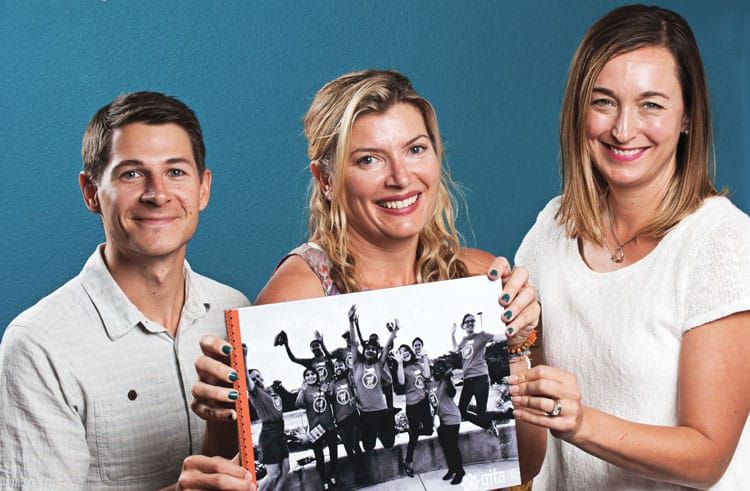Bhakti Chai brews social responsibility along with its tea


Bhakti Chai has grown astronomically in slightly less than a decade, from one woman in her kitchen to a national company that pulls in millions of dollars in profit annually. Bhakti’s story is a case study in how to merge business and charity, and it’s a how-to guide in street-level marketing.
Brook Eddy founded Bhakti Chai after she took a trip to India in 2002 and fell in love with drinking homemade chai. When she got back, she wanted to recreate that for herself. Her background was in social policy, not business, and she initially gave her brews away as gifts, rather than selling them.
She started brewing in 2005, and her chai was so popular that her friends would take it out of her fridge and leave money on her counter. A year later, she started to sell it, and it was hard going. She’d stay up all night brewing a batch, then load it up in her car and sell it by the gallon to cafes, coffee shops and farmers’ markets. But this was more than a business for her — Eddy speaks about Bhakti as if it’s a living being, and she sees her company as having a spiritual mission.
SPONSORED CONTENT
That’s how she settled on the name “Bhakti,” which is a Sanskrit word that roughly translates to “devotion to, fondness for, homage or faith in” a personal god. For Eddy, her personal god is social action.
“It’s volunteerism and helping your neighbors and your brothers and your sisters on this planet is a part of a devotion for me, so that’s really where a spiritual path comes from,” she said of the mission she wants to accomplish through her company. “Helping people and trying to open your heart to people very close to you in your own backyard and people across the world.”
Eddy wanted Bhakti to be about volunteerism, giving and social justice before she started selling it. The first batches that she gave as gifts were part of that devotion to her, and she sought out nonprofits that she could fund through her company.
“From the beginning, I wanted it to have a social mission, so running it like a company but having the soul of a nonprofit.”
Bhakti initially gave to local nonprofits that supported women’s health issues, especially reproductive health, and made a point to use only fair-trade ingredients.
Two years after she first sold Bhakti, Eddy quit her job to dedicate time to creating a retail presence. She hired her first two full-time employees, and, in 2009, broke through in retail.
Eddy brokered a deal with the Whole Foods store on Pearl Street in Boulder to start selling her chai — at first, she only gave them one quart. Now, that same Whole Foods orders six gallons of Bhakti a day, Brianne Jewkes, a Whole Foods dairy buyer, said.
That was the start of a breakthrough for her business, but it wasn’t until 2011 when the landscape of her company really changed. That’s when Bhakti started selling ready-to-drink chai that was already mixed with milk, and Eddy said the convenience of that offering made Bhakti more accessible to consumers and transformed it into a national company.
By this point, Eddy was running a national company with no formal business training and no knowledge of the beverage or natural-foods industries. She did have an entrepreneurial spirit, though; as a kid, she used flyers to market her Girl Scout cookies, and to advertise herself as a babysitter, snow shoveler and landscaper.
“So far, that entrepreneurial spirit has been enough to carry me through, but obviously it’s a really big learning curve,” she said with a laugh. “I was a little naive.”
So, to grow Bhakti nationally, Eddy used the same tactics that worked for her as a kid, and that worked when she was selling chai out of her car. She took the guerrilla marketing nationwide.
Bhakti bought a tuk-tuk, a sort of three-wheeled, motorized rickshaw that’s commonly used as a taxi in Southeast Asia. Eddy painted it bright orange, covered it with Bhakti’s logo, named it “Ginger” and set it on a cross-country tour.
Ginger — which is the first street-legal electric tuk-tuk in the United States — drove from California, through the Southwest and South, up the East Coast, through the Midwest and back to California.
That was nothing if not effective; Bhakti’s revenue is up to $7 million a year, it now has 40 employees, and its charitable contributions have increased more than tenfold, to more than $100,000 a year, up from $10,000. Bhakti is moving into a new brewery that is four times larger than its current one, and it launched a new social giving platform called Gita (Give Inspire Take Action) Giving, which manages Bhakti’s charitable contributions and connects Bhakti consumers with social-justice projects all over the world.
“Other entrepreneurs ask me how to know when to keep going, and you just know,” Eddy said. “It’s about something larger than me, Bhakti wants to live and she wants to grow and I’m just her steward.”

Bhakti Chai has grown astronomically in slightly less than a decade, from one woman in her kitchen to a national company that pulls in millions of dollars in profit annually. Bhakti’s story is a case study in how to merge business and charity, and it’s a how-to guide in street-level marketing.
Brook Eddy founded Bhakti Chai after she took a trip…
THIS ARTICLE IS FOR SUBSCRIBERS ONLY
Continue reading for less than $3 per week!
Get a month of award-winning local business news, trends and insights
Access award-winning content today!

